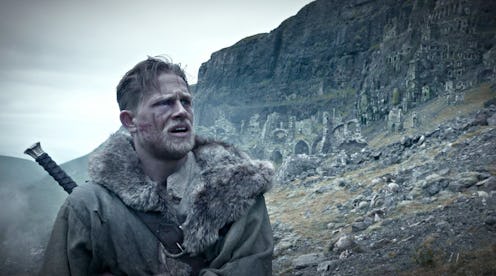Entertainment
King Arthur's More Real Than You'd Think

The tale of King Arthur is once again being explored in a new film, King Arthur: Legend of the Sword, starring Charlie Hunnam and directed by Guy Ritchie. Hunnam is playing the famed King himself, and though it's a period film, separating fact from the myth can be especially challenging for Medieval tales, which means even questions like whether King Arthur is based on a real person are complex.
The adventures of King Arthur, his lady Guinevere, the magician Merlin, and the famous egalitarian symbol of the Round Table have been told and retold in every medium for many centuries, but there is very little evidence that shows that Arthur, powerful king and accomplished military hero, ever really existed. Alan Lupack, a scholar at the University of Rochester and former president of the North American Branch of the International Arthurian Society, notes in The Camelot Project that Arthur may have been introduced by ninth century Welsh monk Nennius, who referred to him as a military leader and "the victor in a series of twelve battles against the Saxons," but not as a king. Lupack also explains how 12th century writer Geoffrey of Monmouth introduced the character of Arthur in his History of the Kings of Britain, which was maybe not exactly rigorously peer-reviewed for historical accuracy at the time, let's just say.
In a recent National Geographic article about the archaeological exploration of the historical site of Tintagel, which some say is where King Arthur was conceived, historians duke it out over not only if Arthur is truly connected with Tintagel, but also whether the much mythologized king really did exist at all. Archaeologist Susan Greaney, a senior property historian with charity English Heritage, expressed extreme skepticism about Arthur being a real person, telling National Geographic that "The Arthurian connection [to Tintagel] is a purely literary, legendary connection."
Other historians remain more optimistic. National Geographic also spoke to Christopher Snyder, who wrote The World of King Arthur and is a dean and professor of history at Mississippi State University. Snyder points out that, "We don't have evidence to prove his historicity, but we certainly don't have evidence to prove he's manufactured." Snyder also brings up another important angle, which is that, simply put, history is enormous. Many of us (or myself at least, B-student in history class that I am) have a tendency to see much of Western human history that occurred before, say, 1600 AD as blurred together and rather similar. Snyder, however, shared that "almost everyone in the Middle Ages believed that there was a historical Arthur," who lived long before they did, in the fifth or sixth century.
So Arthur, regardless of whether or not he was a truly real human, has been a very real figure for centuries upon centuries now. Most members of contemporary society certainly all have their own idea about him, shaped in large part by pop culture representations such as Excalibur, The Sword in the Stone, and 2004's King Arthur.
For his part, Hunnam says he has brought an approach to the role of Arthur that has allowed him not to be beholden to historical records, ever-evolving legends, or previous pop culture representations. In an interview with the Los Angeles Times, Hunnam admitted to being very familiar with previous King Arthur stories, but said, "I think one has to liberate oneself completely from all of the historical significance and weight over the years that a character or piece of storytelling has built up." Hunnam noted that he focused on the specific character in this specific script, and said of his acting process, "it's got to be personal and it's got to come from inside."
Thus, the star's new incarnation should carry on the legend and mold it evermore, as all previous stories have done. Long live the enigmatic King Arthur, in spirit if not in body.